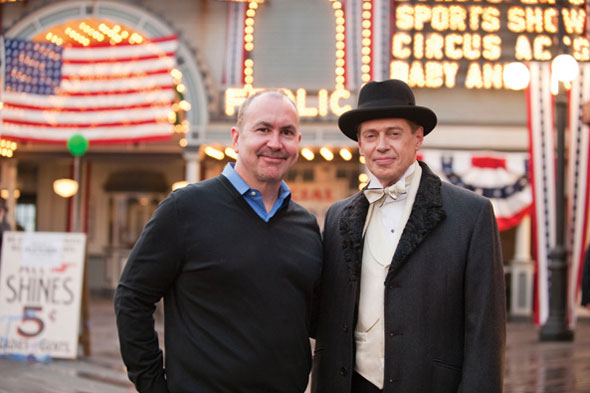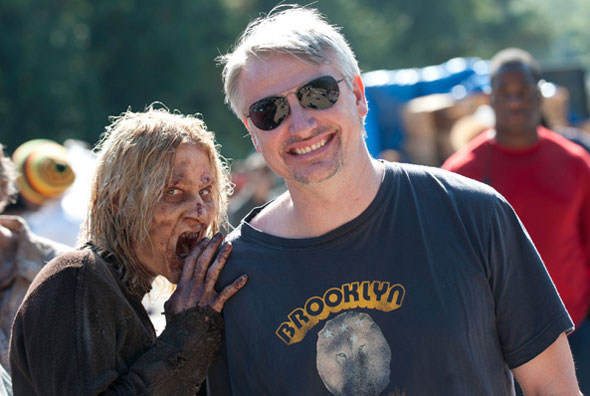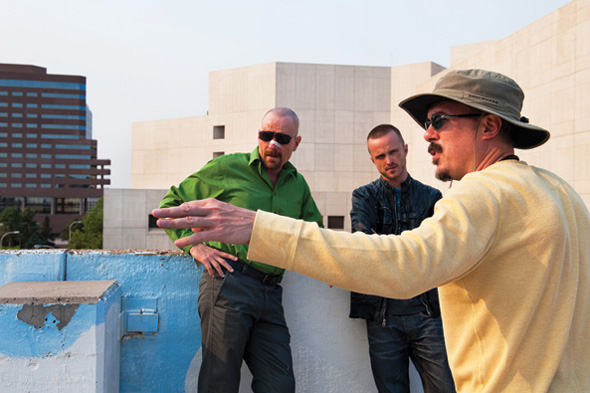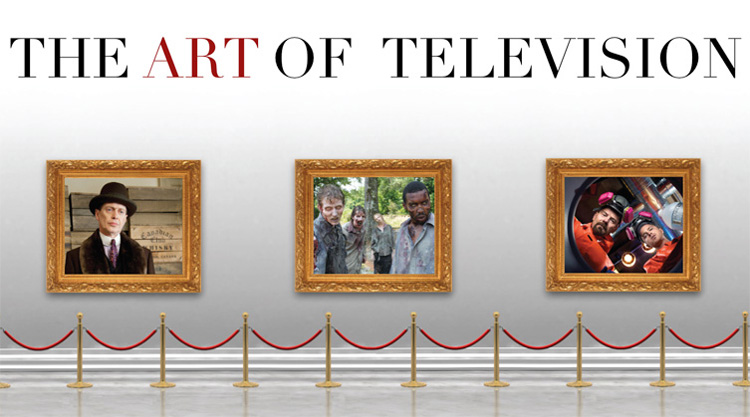Three revered showrunners describe how they make serious drama
by Renée Alfuso / CAS ’06 and Jason Hollander / GAL ’07
Legendary film auteur Martin Scorsese certainly didn’t need to venture into television. But the medium—once called “chewing gum for the mind”—proved the best place to live out a decades-old fantasy. “I’ve always dreamed of getting involved with a project where characters could develop over time, almost like the way Victorian novels were written,” Scorsese (WSC ’64, STEINHARDT ’68, HON ’92) explained after winning his first Emmy Award in 2011 for directing the pilot of HBO’s Boardwalk Empire, for which he is also executive producer. And so, TV could count yet another convert: “It gives you more license, and much more freedom.”Indeed, ever since the hulking, panic attack-prone Tony Soprano sauntered down his driveway and into our consciousness back in 1999, the rules of TV storytelling haven’t been the same. Heroes no longer need angular jawlines or righteous creeds—in fact, they’re often monsters we find ourselves rooting for. The Sopranos, along with dramas such as Six Feet Under, The Wire, Dexter, Game of Thrones, Homeland, and Mad Men, has twisted the paradigm, demanding viewers to focus, soul-search, and empathize—at times against our better judgment—like never before. “It’s a deeper, more complex, more long-range kind of storytelling that has led people to compare The Sopranos to War and Peace,” says Karen Hornick, who teaches the Poetics of Television at the Gallatin School of Individualized Study.
Not so long ago, Hornick notes, “Television had a sort of justifiably bad reputation because it was always associated with commercialism”—hawking that certain detergent or car. But now good TV is a “product” itself and has found a home, most often, on cable channels such as HBO, Showtime, AMC, and FX. This new golden age started bubbling in the late 1990s but came to a boil at last year’s Primetime Emmy Awards, when—for the first time in history—there wasn’t a single broadcast-network series among the Best Drama nominees. It’s paid off financially as well. HBO, for example, grew its subscribers from 24 to 30 million over the past 14 years, and the network earned about $4 billion in 2010—accounting for one-quarter of the operating profits of parent company Time Warner. And, in turn, talent is flocking: Movie stars now line up for roles meatier than anything offered on the big screen, while top writers make TV a goal rather than a fallback.
Of course, the dramas we follow each week don’t come easy. Like conductors of an Italian opera, a new kind of maestro frantically, painstakingly engineers the stories. Called “showrunners,” these creative gurus oversee the writers’ room as well as the minute-by-minute operation of an entire series. NYU Alumni Magazine sat down with three of the biggest names in the business—the brains behind Boardwalk Empire, The Walking Dead, and Breaking Bad—who told us about their heftiest challenges, deepest fears, and what it takes to keep these narrative machines moving.

Brooklyn native Terence Winter (WSUC ’84) served as executive producer and chief writer on The Sopranos for five seasons. In 2010, he created the Emmy Award-winning HBO historical drama Boardwalk Empire, which follows Atlantic City’s corrupt politician Nucky Thompson as he battles bootlegging gangsters during Prohibition.

The show has such complex story lines. Does that require more faith in your audience?
I write the show assuming that the audience is intelligent, adult, curious, maybe knows a little about history or, if not, is interested in history. I think that would probably make up the most satisfied viewer because if you’re willing to put the time in and actually pay attention and not balance your checkbook while you’re watching this, that’s how the show works best. You really need to focus. We don’t spoon-feed information to people; it’s not wrapped up in a neat little bow, because that’s what life is like.
In Season 2, you killed off a major character, saying that anything less “would have felt like a TV show.”
Yeah, it’s gotta feel real to me. I can tell when I’m watching something [and] some convenient plot device happens. Keeping Jimmy Darmody alive would have been exactly one of those things that would make me as a viewer cringe and say, “I don’t believe these guys anymore; I don’t really believe you’re a gangster because you would have killed this kid.” That was really the only way out, and I just wouldn’t have been able to live with the false storytelling, even though it might have been better for us as a show.
I mean, people went absolutely ape shit when I killed Jimmy—I got threatening posts on the Internet. [But] I’m not doing the show to just please the mass audience—I’m doing a show that I can be proud of, and be truthful in the way I tell the story. And yeah, I hope people watch it, of course, but I’m not gonna let the audience be the tail that wags the creative dog here. It’s gotta make organic sense.
Is it tough to keep trying to surprise viewers?
Yeah, it’s really challenging. That’s one of the reasons the Jimmy Darmody thing was so satisfying for me,
because people were surprised by it. You know, it’s just decades and decades of TV and movie history: People
understand the language of film and storytelling, and they’re kind of ahead of you a lot. It’s like you gotta
try to invent new ways to fool an audience and keep them surprised, and they love it. I mean that’s what
you’re hoping for as a viewer, to go, God, I did not see that coming.
What would you say TV offers that film can’t?
Well, nowadays, just the ability to tell stories that involve characters as opposed to cartoon figures and superheroes. The night we premiered in 2010, the lead-in to Boardwalk Empire was Transformers 2, and I remember sitting there watching it and thinking: This is amazing—the Hollywood movie is this big action comic book and the sweeping historical epic is a television show, and it’s completely ass backward. It used to be the other way around—TV was frivolous, you know, silliness.
Have you noticed a change in
dramas since working on The Sopranos?
Absolutely. You can sort of draw a straight line from The Sopranos to two dozen other shows. The types of storytelling, the types of casting, the types of subject matter—that was just groundbreaking. I mean just the idea that you could cast Jim Gandolfini in the lead. That’s part of why it just felt so real, and then that started to bleed into other shows.
Some people criticized the ending of The Sopranos. Will that influence how you choose to end Boardwalk Empire?
Well, it won’t in the sense that I’m certainly not afraid of being criticized. I love the ending
of The Sopranos. So whatever the ending ends up being, I think I’ll just go for it, and I’m not trying
to necessarily piss anybody off or please anybody, I’m just doing the best job creatively. I always said this
show’s gonna end with a very, very elderly Nucky walking into a diner and killing Tony Soprano [laughs]. That’ll just bring it full circle.

After five years writing for The Shield, Glen Mazzara took over as showrunner for AMC’s The Walking Dead, based on the award-winning, cult-favorite comic book series. Mazzara (WSUC ’89, GSAS ’93) recently stepped down after the show’s third season, despite breaking TV records as the highest-rated basic-cable drama in history. He’s now in talks to write a film prequel to The Shining for Warner Bros.

Zombie movies have been around for decades, but this is the first TV show. Does the different medium create new obstacles?
It does, because week after week we have to show our characters living with the zombies. And yet they
can never become commonplace because that way they would cease to be frightening. So how do you keep the zombies fresh and interesting and scary, when really they’re sort of slow-moving, dim-witted creatures?
But the show’s about much more than just running from zombies.
It’s really about people trying to survive in an apocalypse, when there’s a breakdown of society and there’s no help coming. There’s no government, no military, no health care or infrastructure anymore. And it just becomes the story about a simple tribe out there on the road trying to protect each other, to deal with losses, to find simple things like food, water, and shelter—things that we always take for granted.
Then as the show advances, it becomes about those people trying to rebuild civilization, and how do we make our way back from this cataclysmic event? One of the things that we’re interested in exploring is that the greatest horror is not so much the zombies but the other people. Now that the rule of law has broken down and people’s inhumanity starts coming out, that’s really the true horror of that world.
It seems like each week anyone’s number could be up.
We don’t ever want to feel like we’re a safe show where people watch and say, “Oh, they’re
not really gonna kill off this character.” And we’ve done that—we’ve killed off significant characters
in very surprising ways that have deviated from the comic book. So by doing that we really put the audience on the
edge of their seats. When I say no one is safe, I really mean no one is safe on this show.
That makes it more suspenseful to watch, but is it hard for you to let go of your favorites?
Yes, it is. This season we had to kill off a character [who] I really loved writing for, but the story dictated that someone had to die. I had to call the actor to tell them; I make those calls, and those conversations never go well. It’s difficult to say, “Hey, I know you’re having fun, but now you’re out of a job.” But that’s the nature of the show, and if we don’t do that it’s going to feel dishonest.
You’ve drawn from personal experiences, like the scene where Maggie says goodbye to her father.
Yeah, unfortunately my mom passed away [last] spring. She was on life support, and I couldn’t get to New York in time. Her death was imminent, so my sister held the phone up to her and I got to sort of say goodbye and just thank her for everything. It was really an incredibly painful experience, but then when we came to this scene in the show, I just really wanted to write that and put that out there. What was surprising is that via Twitter a lot of people reached out and said that they’d had a similar experience. And it was really meaningful to know that that simple scene resonated for so many different people. You want to connect emotionally with the audience, and to do that you have to write as honestly as you can.
Do you ever have zombie nightmares from working on the show?
I had one zombie nightmare a few months ago—I think I was having a rough week at work or something. I was definitely being eaten alive, and then I woke up. It was pretty scary—that’s a horrible way to go, being eaten by a reanimated dead person!

Inspired to write after watching The Twilight Zone as a child, Vince Gilligan (TSOA ’89) honed his craft in the 1990s on the pioneering Fox mystery-drama The X-Files. He then had a brazen idea for a show—about a high school chemistry teacher who starts cooking crystal meth when he’s diagnosed with terminal cancer. The show has won seven Emmys since Breaking Bad premiered in 2008, and the final season will air this summer.

Why has TV become such a beacon for adult dramas?
These days more and more money goes into fewer and fewer movies. [Film executives] look at the shrinking box office and they say to themselves, we better give them what they want. But there’s still, and I hope there always will be, that desire for storytelling for grown-ups, and that sort of has fled to television. It had to go somewhere.
And that somewhere was cable.
It goes without saying that if Breaking Bad were on a network, it would have been canceled within its first half-hour, in terms of pure viewership. But what I love about our show is that the people who love it really, really love it. I can’t believe it ever got bought in the first place, because on paper it shouldn’t fly. A middle-aged guy dying of cancer and cooking crystal meth…I am often surprised it works and that folks keep coming back.
Speaking of which, you’ve created one of TV’s most polarizing heroes. Are you afraid the backlash against Walter White could become too intense?
In the early days I worried about it greatly. It’s why Walt was diagnosed with cancer in the pilot;
it’s why he had a second job in the pilot, and [a job] in which he’s mistreated by the rich, snotty
kids whom he teaches. Honestly, it’s why he has a son with cerebral palsy. I was sort of loading up the
sympathy factor in the early going so that he could become increasingly darker and the audience would still
sympathize with him for as long as possible. But I realize in hindsight that I didn’t need to worry as
much about likability. The only thing really to worry about is telling an honest story and staying true to
the character.
It’s funny, the audience is more tolerant sometimes and more understanding of Walt than I am. I think he’s [laughs] pretty much an irredeemable bastard at this point, but there’s a sizable chunk of the audience who still roots for the guy. And that’s fine, they’re not wrong. Breaking Bad was always meant to be kind of an experiment in television in which the main character is always on the move, always transforming from who he was to who he will eventually become.
Do you ever lose faith that you’re plotting the story just right?
You know, your confidence waxes
and wanes. I had another bout with
it last week when I thought, everything
we’re doing is shit. But I have
these six other writers who can say,
“Come on, man, relax. Step back
from the edge of the cliff. It’s not
that bad. We have a lot of good stuff
here.”
You’re about to wrap up this intricate series after six years. Any chance you’ll be truly happy with the ending?
Probably not [laughs]. I picture myself a year and a half from now waking up out of a sound sleep and having the perfect ending, except it’s six months too late. And that troubles me. We’re trying to be chess players and think 20 moves ahead, and I fear sometimes there’s a very obvious permutation right under our noses that we’re gonna miss. But I can tell you we’re working our butts off to think it through.
That’s all you can do, right?
It’s all you can do. Life itself does not contain a lot of perfect endings. It’s just sort of messy and shapeless, and it just kind of goes on until it dribbles and peters out at the end. So there’s artificiality to begin with, to endings in movies and television. It’s a good thing to reach for—a proper, satisfying ending. But we realize that they don’t necessarily represent what we know of life.








